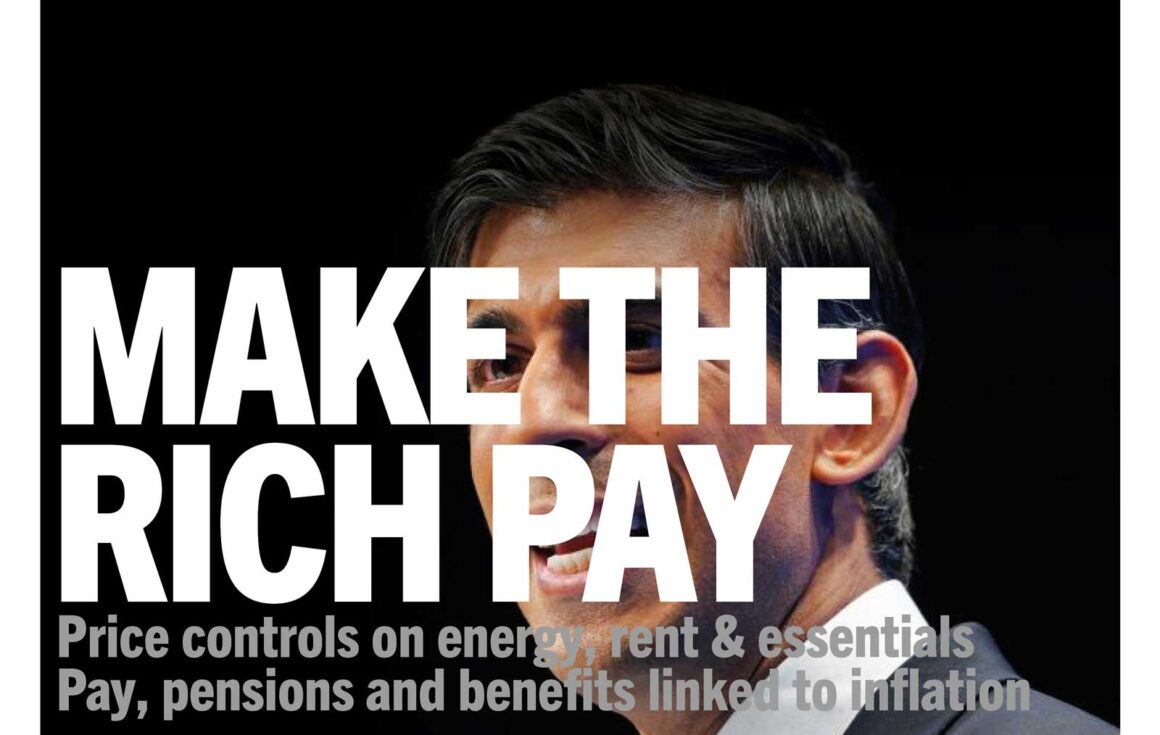

FOR MONTHS economists have been predicting inflation, even according to the massaged official statistics, will soon hit double figures. Indeed for the poorer sections of the population it already has. The Economist predicts this will persist well into 2023. The Bank of England will continue raising interest rates, slowing the economy and increasing unemployment, and likely triggering recession.
Union officials have been slow to launch a co-ordinated national campaign against the rising cost of living and falling real wages. But—at last—the TUC has called a national demonstration for 18 June under the slogan ‘We Demand Better!’ Many unions are now booking coaches and trains for a monster march in London. Demonstrating our numbers and the enormous potential strength of the labour movement is important—if it acts as a launch pad. If it is the start of a serious campaign to force employers and the government to concede wage claims that match the real increases in prices facing working class families, raising universal credit and pensions and forcing lower fuel and food prices and housing costs.
The unions and the TUC have the researchers and other resources to create a useful alternative to the official cost of living indexes, which misrepresent the true cost of living for most working class people. WE need a workers’ index so that unions can put in claims that cover the actual rise in prices, widely publicised to expose how the working class is being made to pay the cost of the crisis.
Union branches need to mobilise for 18 June. But those who remember similar demonstrations over the past decade, (over pensions or market ‘reforms’ to the NHS), will recall that all too often they marked the end of a campaign not a launch pad for action. If we leave it to the TUC or the executives of Unite, Unison, the GMB, the NEU, etc. the same will happen again.
Unity and organisation
We need unity in action—a unity that begins at the grass roots, in the workplaces and union branches, including the new unions that have been organising workers is the gig economy. We need to bring together BAME communities, women’s organisations, left labour parties and socialist groups, plus tenants and anti-poverty campaigners. Together they could organise effective local actions and solidarity with anyone and everyone who fights back. These bodies could build upwards too, mounting irresistible pressure on our ‘leaders’ to initiate nationwide actions.
We can use the mobilisation for 18 June to initiate local action groups. What they are called does not matter. Whether they are set up by trade union councils, or local people’s assemblies or just ad hoc cost-of-living groups, the aim must be to continue their existence after the big march, campaigning in the city centres, rallying forces to support every sector of workers which strike action. We must shun sectarian conflicts over branding of campaigns or excluding groups we politically disagree with.
After 18 June all the organisations that mobilised should call rallies and conferences in towns, cities and London boroughs to plan solidarity actions with rail workers, bus drivers, bin workers, teachers, and organising efforts at Amazon, Deliveroo, and other logistics workers. Many of these are balloting for strikes or taking wildcat actions. We need to make sure they are joined by large numbers demonstrating in support of their picket lines.
• • •
STRAIGHT AFTER Sue Gray’s report, Boris Johnson was quick off the mark to urge us all to ‘move on’, accept apologies and forget the whole affair. But why should we? The picture painted by her investigation revealed a glimpse of the behaviour and social attitudes of those who run the country.
Dozens of politicians, their advisors and top civil servants regularly joined in ‘wine time Fridays’, partying from 4pm to 4am. Johnson’s political aide Martin Reynolds certainly knew this was against lockdown rules when he messaged others after one party, ‘We seem to have got away with it.’
Spilling of wine over carpets and walls, vomiting in corners, at least two separate fights… all recall images of public school boorishness or the Oxford University Bullingdon Club, of which Boris Johnson was a member.
But the most damning revelation was the lawmakers/breakers’ treatment of the staff who had to look after Number 10: the cleaners and security staff. ‘I was made aware of multiple examples of a lack of respect and poor treatment of security and cleaning staff,’ reported Grey.
Workers’ indignation at these scenes is not only or mainly a moral judgement but a political one. We are told constantly to abide not just lockdown rules but the anti-union laws, restrictions on the right to protest and draconian immigration controls. If they can break the rules, why can’t we?
Expecting Tory politicians to reform their behaviour is like telling pigs to look after their pens. Hopeless.
Instead we should commit ourselves to overthrowing the rotten parliamentary system, with its privileges and unaccountability, and installing a workers’ government, based on and responsible to the fighting organisations of our class.
Then we can dump the whole lot of them in the rubbish bin along with their empty bottles and sick bags.